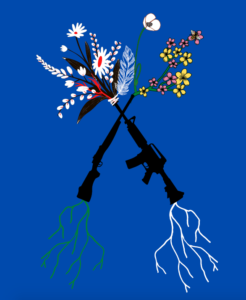Welcome

Over the past three years, our student team has developed The Visualising Peace Library, an online database of bibliographic references designed to promote cross-disciplinary conversations about peace and peace-building.
The Visualising Peace Library has two core aims. Firstly, it represents a footprint for our various research projects – in particular, our Museum of Peace and the series of reports, blogs, short films and interactive tools published on our project website. Secondly, it is designed not just to reflect the research that we have been doing but also to stimulate and expand future research. In bringing together a wide range of publications, from different disciplines and sectors, we aim to stretch and inspire new habits of studying, learning and thinking about peace.
We are building a growing portfolio of blogs and presentations to complement the resources we have gathered together in the Visualising Peace Library. Students from different disciplines have taken time to highlight particular items or connections and contrasts between items which have struck them as offering fresh insights into peace or peace-building. We hope that you find these stimulating as you explore the wider Library.
You can browse the resources we have gathered together via the Library button below, or click on Learning Journeys to be guided through some of our resources by members of the Visualising Peace team. You can also dip into a ‘pot luck’ selection of our latest library entries at the bottom of this page, and explore some of the themes we cover via the cloud of ‘tags’ on the right.
The Political F. Scott Fitzgerald: Liberal Illusion and Disillusion in ‘This Side of Paradise’ and ‘The Beautiful and the Damned’
Monk, Craig. 1995. American Studies International 33, no. 2: 60-70. Monk discusses war and peace in two of the interwar novels of F. Scott Fitzgerald, who fought in…
Psychic decolonization in 1960s science fiction
Higgins, David M. 2013. Science Fiction Studies 40, no. 2: 228-245. In this introduction to a literary journal, David Higgins analyzes the political undertones in novels such as Frank Herbert’s…
Screen memory in Waltz with Bashir
Stewart, Garrett. 2012. Film Quarterly 63, no. 3: 58-62. Garrett Stewart argues animation and documentary-style filmmaking/writing enhance the constructed nature of memory and trauma in Ari Folman’s 2008 documentary Waltz…
Adding up the gestures: what we see of Harry Lime
Toles, George. 2012. Cinema Journal 51, no. 3: 142-149. Toles analyzes the antagonist of The Third Man (1949), Harry Lime, arguing he is an allegory for Hitler and Stalin,…
Habsburg’s Last War in Austrian films, 1918 to the present
Leidinger, Hannes. 2018. University of New Orleans Press. This article presents an analysis of the appearance of Habsburg monarchs and the pre-World War I Austrian Empire which was common…
Writing the dismembered nation: The aesthetics of horror in Iraqi narratives of war
Bahoora, Haytham. 2015. The Arab Studies Journal 23, no. 1: 184-208. Bahoora presents a discussion of three Iraqi novels (Luay Hamza Abbas’s Closing His Eyes, Hassan Blasim’s The Reality and…
Waltz with Bashir (2008): trauma and representation in the animated documentary
Kraemer, Joseph A. 2015. Journal of Film and Video 67, no. 3-4: 57-68. Kraemer argues the animation in Waltz With Bashir (2008) softens the real violence and atrocities committed…
What to do when you have the power; in the meantime, remember to skylark!
Vonnegut, Kurt. 2016. In If This Isn’t Nice, What Is? Edited by Dan Wakefield. New York: Seven Stories Press. A 1970 commencement speech from Kurt Vonnegut, in which…
Anti-War Art Care Civil Society Civil war Collaboration Communication Community community peace Conflicts Aftermath Creation of identity Critical peace Culture Diverse Voices Ethnic Conflict Everyday Peace Failed Peace Fascism Future Peace Grassroots Humanitarianism Human Rights Identity Politics Imperialism Indigenous Studies Inner-Local-Global Peace Inner peace Institutions International Institutions international peace Intersectionality Intervention Journalism Justice Liberal Peace Literature Media Memorialisation Military Music NGOs Peacebuilding Pedagogy Philosophy Policymaking Practice Race Reconciliation Security Studies Social Media Space Sustainable peace Systems thinking Theory Transformation United Nations Urban War Western